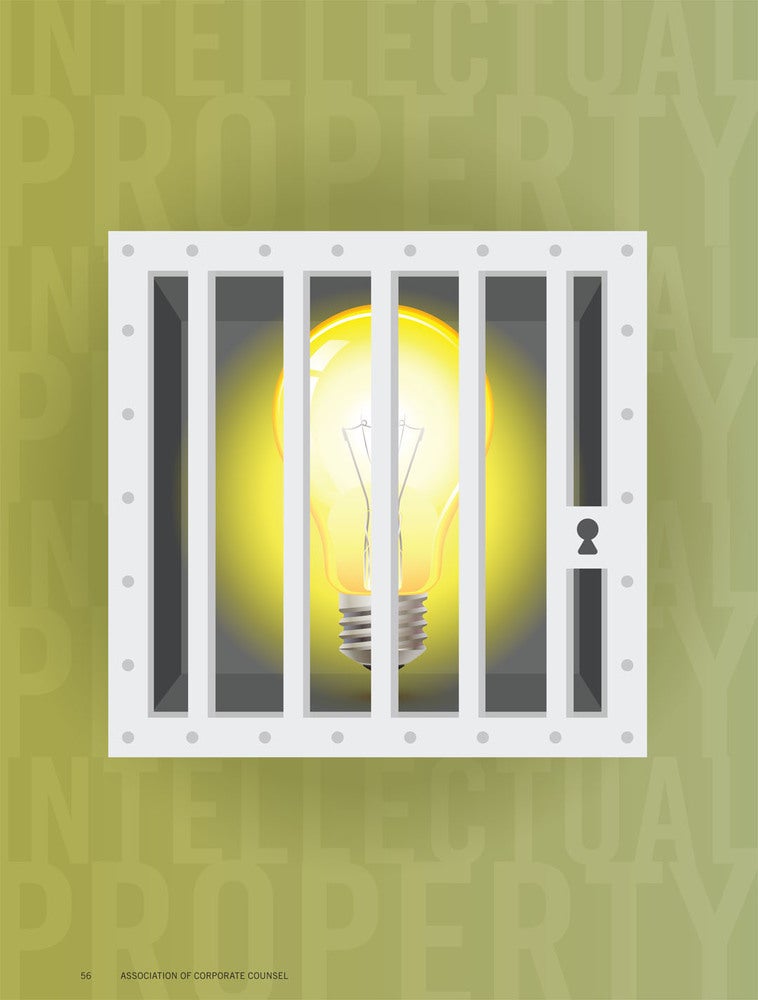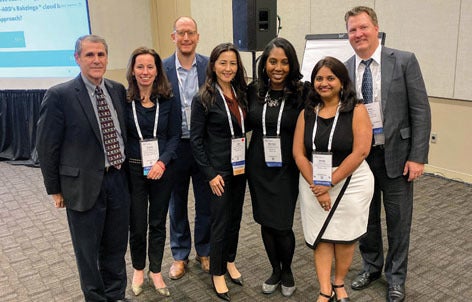
CHEAT SHEET
- Choice of law. When starting negotiations, tackle the choice of law for the agreement and the preferred jurisdiction for dispute resolution.
- Data privacy. Regardless of the governing law you decide on, you must comply with the data privacy regulations in the countries where the intellectual property is being used.
- Joint ownership. During negotiations, avoid joint ownership if possible – applicable laws vary widely by jurisdiction and it is difἀcult to address in agreements and administer in practice.
- Arbitration. Consider arbitration for cross-border IP dispute resolutions as there are often options for proceedings to be conἀdential.
More and more often, in-house counsel are being asked to draft cross-border intellectual property (IP) agreements and handle the legal issues that they often generate. Complicating this task is that most US-based in-house counsel are not familiar with civil code jurisdictions and/or the legal issues facing in-house counsel for companies based outside of the United States. In October 2019, during ACC’s Annual Meeting, I brought together a stellar group of in-house counsel from several international companies, as well as two experienced outside counsel, to address some of the key issues that they face on a day-to-day basis in their own practice.
The panel included:
Bill Calore, director of legal and contracts for Fraunhofer USA, Inc., played the general counsel in the hypothetical (referred to as general counsel within the article).
Ako Williams, who in real life is vice president, general counsel, and corporate secretary of Ushio America, Inc., filled the role of senior in-house counsel on the panel (referred to as senior in-house counsel).
Shilpa Joshi, the deputy general manager of the legal group for Indian conglomerate Mahindra & Mahindra Ltd., offered the perspective of an in-house counsel based in India (referred to as India-based in-house counsel).
Colette Mulder, managing counsel IP at Shell International B.V., who is based in the Netherlands, shared the thoughts of an in-house counsel based in Europe (referred to as Europe-based in-house counsel).
Monique McNeill, commercial and IT counsel for the US industrial aluminum company Novelis, acted as an in-house counsel with specialized knowledge of information technology (referred to as senior in-house IP counsel).
Josh Ganz, of the law firm Kilpatrick, Townsend & Stockton, LLP; and Erik Swenson of the law firm Carlson, Caspers provided the outside counsel perspective (collectively referred to as outside counsel).
To facilitate the discussion, we prepared a hypothetical, in which TuNerds Automotive, LLC (a fictitious company), is in the process of rolling out new, proprietary hardware and software on a global basis. This article is a distilled version of that presentation.

The hypothetical
TuNerds Automotive LLC is a global automotive supplier headquartered in the United States. TuNerds is nearly finished testing its alpha version of a lithium ion battery system product for e-powered vehicles. It is seeking a manufacturing partner (or partners) to help further develop the batteries and the control system, either through a joint development arrangement and/or global contract manufacturing arrangement. As part of a global technology initiative, TuNerds is considering implementing an updated global positioning system (GPS) and artificial intelligence (AI) technology to assist in tracking shipments and optimizing routes for long haul and delivery vehicles.
An India-based software firm may assist TuNerds to develop and implement the global GPS system and AI technology. This will allow the company to track its fleet of delivery vehicles, improve routes through machine learning, increase utilization of the vehicles, avoid traffic delays (or high-risk environments), and reduce costs.
For purposes of this discussion, we assumed that the CEO asked her general counsel to flag the various legal, intellectual property, and privacy-related issues that will occur as these new hardware and software products are rolled out on a global basis. The general counsel has brought together his in-house team and outside subject matter experts to flag the potential legal issues that they may face when negotiating various agreements that TuNerds will need to consider if it is to roll out its products in a timely and cost-effective manner.
Q&A Discussion Choice of law and jurisdiction
General counsel: As an initial point, given the global nature of the potential relationships and agreements, the first issue is the choice of law. What are the advantages and disadvantages of using a common law jurisdiction like New York, England, or India compared with a civil code jurisdiction like France, the Netherlands, Switzerland, or Japan? Do you spend much time negotiating and/or discussing your choice of law provision? And if so, why?
India-based in-house counsel: In every cross-border IP agreement, governing law is one of the most heavily negotiated clauses for Indian parties. If the agreement involves an Indian party and is being performed in India, it is certainly advisable to opt for Indian laws. While foreign parties are hesitant for the same reason, they should still consider it from an ultimate enforcement perspective. In a deadlocked scenario, we agree on English laws as the neutral choice for most cases, and often look to Singapore as a neutral venue, due in part to bilateral treaties addressing enforcement of judgments (see Reciprocal Enforcement of Commonwealth Judgments Act (RECJA)).
General counsel: I’m concerned about choosing a neutral legal system. What happens when one party does not fully understand the impact of that legal system on our agreements? For instance, if we were to agree to French law, there are certain issues regarding assignment of patents that are inherent in the Code vis-à-vis suppliers that might have an impact on how the agreement is enforced.
Europe-based in-house counsel: When you start negotiating a cross-border IP agreement it is important to keep in mind that the agreed-upon law governs the agreement. Also, the dispute resolution forum (arbitration or court) needs to be factored in. For example, in arbitration, the arbitral seat, which may be different from the place where the hearing takes place, determines the law governing the arbitration procedure. Companies have their own preferred governing laws. If the preferred option is not feasible, check the World Justice Rule of Law index and choose a country with a well-developed, acceptable rating.
Outside counsel: We will touch on this more later, but although choice of law is very important from a substantive IP and contract interpretation perspective, it does not eliminate or alter the data privacy compliance framework that we will need to consider for using a cloud solution internationally. In effect, the jurisdictions in which data will originate from and be stored will be a big factor in weighing the risk of using a cloud solution to power our product.
Agreement language
General counsel: My general rule is to draft agreements in English, but there are times when it makes sense to draft agreements in both English and the local language, say Chinese, Russian, or Japanese, to avoid problems with interpretation or enforcement. What are the pros and cons of each approach?
Outside counsel: We recommend holding meetings and negotiations in English. Then draft the agreement in English, whenever possible, and translate or finalize them in the local language, if needed.
Senior in-house counsel: I agree. We almost always negotiate and prepare our agreements in English, but some smaller Japanese companies still insist on drafting agreements in Japanese.
Europe-based in-house counsel: We also almost always negotiate in English. Some companies in certain countries also insist on drafting the agreement in their local language (e.g., Russia, China) or it may be required by local law. In those cases, it is possible to contract in both English and the local language. It is important to clearly state which language prevails in the event of a conflict, giving due consideration to where disputes will be resolved.
Companies have their own preferred governing laws. If the preferred option is not feasible, check the World Justice Rule of Law index and choose a country with a well-developed, acceptable rating.
Venue and dispute resolution
General counsel: I’m a big proponent of arbitration when dealing with cross-border agreements. I’d like to hear your thoughts on the pros and cons of using arbitration versus litigation when negotiating these types of agreements. When you are negotiating cross-border agreements, do venue and dispute resolution issues factor into your discussion, and if so, why?
Europe-based in-house counsel: Yes. For IP, confidentiality, arbitration can be preferred as parties are free to agree that the proceedings are confidential. Some arbitral institutional rules even provide for confidentiality.
Senior in-house IP counsel: If I am not able to have a venue in the United States, our standard fall back is arbitration in Switzerland. I am generally able to get European counterparties and even Asian counterparties to agree to Switzerland. We are usually able to find English-speaking arbitrators, and we have found that procedurally the arbitration proceedings are effective and very similar to US arbitration proceedings.
Enforceability is a whole other topic. From my perspective, whether I am going to be able to enforce my rights under the contract in the firstinstance, is a consideration in choosing the counterparty in the first place. This would certainly affect the risk profile of the transaction. Do they have assets that I can reach?
Senior in-house counsel: Singapore International Arbitration Centre and the Hong Kong International Arbitration Centre are some of the more popular arbitration venues for Japanese corporations.
India-based in-house counsel: Like with governing law, discussions on venue and dispute resolution are extensive when dealing with companies based in India. In addition to confidentiality, arbitration is a much quicker and affordable option than courts. But because of India’s Arbitration Act, you can only locate arbitration outside of India if at least one company is located outside of India. Also, with IP, while you can arbitrate things like royalties, you could not challenge the validity of a patent, etc.
Outside counsel: I agree with all of these locations as common arbitration venues. Another approach is to develop regional preferences depending on the location of the counterparties (and/or assets). In the United States, New York City is a common locale, London for Europe, and in Asia we use Singapore, Hong Kong, or Shanghai when negotiating deals in mainland China.
General counsel: How do you handle injunctions and equitable remedies in your arbitration clause?
Europe-based in-house counsel: It is possible to allow for injunctive relief from competent courts. For example, “Nothing shall be construed as preventing either Party from seeking conservatory or similar interim relief from any court with competent jurisdiction.”
India-based in-house counsel: We include a provision that notwithstanding dispute resolution, parties are entitled to seek equitable relief from the appropriate court. However, the foreign company will often include language that excludes Part I of the Indian Arbitration Act, which would otherwise allow the parties to approach the local India courts for interim relief.
Outside counsel: I agree. Either there is a carve-out in the agreement or both parties can agree to forego injunctive relief altogether. Many of the arbitration institutes, such as Singapore International Arbitration Centre, International Chamber of Commerce, or London Court of International Arbitration, do provide for interim relief or emergency orders, as well, which may allow the parties to exclude seeking equitable relief in the local courts.
Trade secrets
General counsel: Now that we have some of the basic issues about the choice of law, jurisdiction, and venue, let’s turn to the question of who will own the IP: TuNerds or its partners? I know that the definition of IP is not uniform and varies across the various jurisdictions. Unless the parties are comfortable with the definition of IP set out in the applicable code, it is important to clearly specify what IP the parties want to address in our agreement, and how and where it will be used (e.g., IP ownership, licenses, or in the indemnity provisions). This is particularly true of trade secrets. What are you seeing?
Outside counsel: Before the enactment of the Defend Trade Secrets Act (DTSA) in 2016, trade secrets were a state law issue and the definition of trade secrets and their enforcement varied from state to state. The DTSA gives “trade secret” a broad uniform definition: “All forms and types of financial, business, scientific, technical [information] … whether tangible or intangible … if the owner has taken reasonable steps to keep the information secret, and the information derives independent economic value from not being generally known.” This has been an important step to protect trade secrets in the United States.
Senior in-house counsel: For protection under the Unfair Competition Prevention Law in Japan, the information must be (1) maintained in a confidential manner (only those who have the need to know can access, and those who access recognize it as a trade secret, (2) useful for the company’s business, and (3) non-public. You can seek damages, injunctions, and recovery of reputation (such as publication of a letter of apology). If the purpose of the use of the trade secret was to improperly gain profit or to cause damage to the trade secret owner, then the act would be subject to criminal prosecution.
India-based in-house counsel: In India, there is no separate statute specifying or governing trade secrets and to the extent they are recognized they are enforced under common law of torts, where you can seek damages or an injunction. It is up to the owner of the trade secret to demonstrate ownership and steps taken to keep them secret.
Europe-based in-house counsel: Trade secret requirements are governed by EU Directive 2016 (as implemented by the various EU countries). Requirements are: (1) Information is secret in the sense that it is not generally known among or readily accessible; (2) It has commercial value because it is secret; and (3) The information has been subject to reasonable steps/measures to keep it secret. Reasonable steps are not defined and will depend on the industry. They may include confidentiality clauses in contracts (including employment contracts), explicitly naming or registration of the trade secret, monitoring, encryption, etc.
Foreground and background rights
General counsel: What about this issue of foreground and background rights? How should TuNerds approach the allocation of these IP rights?
India-based in-house counsel: We include exhaustive definitions of background and foreground IP with corresponding exhibits specifying details of the exact description of pre-existing IP and IP to be developed under the project. Once the definitions are specified, ownership clauses should correspond to respective parties. We also begin our negotiations with the proposition that the party commissioning and paying for the development owns foreground IP.
Europe-based in-house counsel: This is where your definitions come into play and why it is important to clearly state what each party is contributing and/or agreeing to. If you leave things to the civil code, you may not have a clear understanding of what the “rules” are for the collaboration.
Outside counsel: Generally speaking, the party commissioning and paying for development owns the foreground IP. In the software development space, for example, things may shake out a little differently depending on the party with whom TuNerds negotiates. In negotiating with a software company that owns proprietary code, it is unlikely that they will give up ownership of any configurations of its software code/solution that TuNerds implements. They will not want to preclude their use of future improvements to the solution or limit their other customers’ rights to make similar configurations of their proprietary code. However, as between TuNerds and a contract software company, we need to clearly state that any customized software code developed for TuNerds will be owned by TuNerds.
Joint ownership of IP
General counsel: One particular issue that I am concerned about is the possibility of joint ownership in the patents or copyrights we develop. What is your “best practice” when it comes to drafting language around joint ownership?
Outside counsel: We always avoid it, if at all possible. Rights can more easily be granted to the other party via an exclusive or nonexclusive license as necessary. The laws governing joint ownership of different types of intellectual property vary widely from country to country, and while joint ownership often sounds fair and reasonable to the business people, it is difficult to address in an agreement let alone administer in real life. Often, the parties end up spending a significant amount of time trying to negotiate the rights and responsibilities of each party, as well as exit strategies with respect to IP that does not exist, which creates uncertainty, adds costs, and often results in the inevitable dispute over who owns what.
In a cross-border context, TuNerds IP will have to be protected in multiple countries. Intellectual property rights are generally governed by local laws, so agreement on choice of law/jurisdiction may or may not be relevant as to IP rights.
Senior in-house IP counsel: In the United States, joint owners can freely exploit the IP for themselves without consent of the other joint owners. TuNerds certainly wouldn’t want any third-party software companies to leverage the new code with a competitor, so we should discuss this in the contract.
Senior in-house counsel: Best to avoid. In a cross-border context, TuNerds IP will have to be protected in multiple countries. Intellectual property rights are generally governed by local laws, so agreement on choice of law/jurisdiction may or may not be relevant as to IP rights. Different countries have different rules on joint ownership, exploitation (whether an owner can freely license without seeking permission from the other joint owner, etc.), and enforcement (whether all joint owners must join a suit, etc.). There are also differences between patents, trademarks, and copyrights. Agreement on exploitation and enforcement may be meaningless if the asset is sold to a bona fide third party. In Japan, a single joint owner of a patent can institute a lawsuit against a third party without joining the other owners; whereas, in the United States, each joint owner must join a suit to enforce the patent against a third party. In Japan, a joint owner would need permission from the other joint owners to grant licenses to third parties, whereas in the United States, you don’t need permission from the other joint owners.
India-based in-house counsel: I agree. It is best to avoid it. If a party insists, we can negotiate and provide a mechanism to deal with such things as whether a co-owner can license to a third party without consent of the other party; provide each co-owner a first right of first refusal if the other party attempts to assign its rights in the jointly held intellectual property; enforcement actions to be jointly undertaken. In addition, if you have an exclusive license, it is advisable to record the exclusive licenses in cases of patents in India, as it entitles the licensee to equivalent rights and protection as that of an owner, and includes the right to initiate infringement actions.
Europe-based in-house counsel: Best to avoid. Depending on the importance and sensitivity of the foreground IP, you may want to consider negotiating a certain process for it upfront (can be long and difficult negotiations) or leave it for discussion when it is created, when you know what it is and can better determine whether you want rights in it.
General counsel: This will take us to the license grant. The two options we have will be an exclusive license or a nonexclusive license. I understand this differs from country to country? license, the licensor may prefer to keep control, to also take into account the interest of the other licensees. With an exclusive license, some countries allow the licensee to take action unless you contract out of it. Disadvantages for licensor can be that licensor may be pulled into a suit by a licensee and therefore have financial exposure in a lawsuit. If the suit is against a licensor’s customer, it can impact the relationship with this customer. Also consider whether the licensor may need to maintain the patents and absorb the resulting costs. In addition, for an exclusive license, you may want to consider trigger events that lead to changing the exclusive license into nonexclusive or terminating.
General counsel: I understand that Japan has some unique rules regarding exclusive licenses. Can you walk us through that?
Senior in-house counsel: In Japan, the most significant difference found in the license grant may be the distinction between registered and unregistered “exclusive” licenses. The license grant needs to clearly specify which type of license is granted. The first is Senyo-jishiken. Often translated as an “exclusive license,” this is equivalent to an assignment or grant of “all substantial rights, including the right to enforce the patent against third parties.” Senyo-jishiken is enforceable only if it is registered with the Japanese Patent Office; otherwise, it would be treated as a semi-exclusive license, not as an assignment-in-fact. Under Senyo-jishiken, the licensor does not retain any right to use or enforce the licensed patent. A registered exclusive license is very rare (perhaps one percent of all licenses). The licensee has standing to sue third parties.
The second is Tsujo-jishiken (ordinary license), which is a contractual (not a registered) assignment-in-fact (assignment of all substantial rights); the licensor does not retain any right to use or enforce the licensed patent. The third is Hikanzen dokusenteki tsujo-jishiken (incomplete exclusive ordinary license), which is equivalent to an exclusive license common in the United States. Japanese courts have held that the licensee does not have standing to seek injunction against third-party infringers even when the license is a complete exclusive ordinary license. On the other hand, courts have held that a complete exclusive ordinary licensee has the right to seek damages from third parties
Ownership of and/or assignment of IP rights
General counsel: What substantive IP protections are there for the code that is created (e.g., copyrights, trade secrets, confidential information)? What are the default rules in the United States, the European Union, and Japan? What about machine-learning capabilities, to the extent that the AI solution automatically creates code?
Senior in-house counsel: Under Japanese law, only a natural person can be an inventor. The individual would have to assign the invention to the employer for the employer to file for a patent, with the caveat that the employer must reasonably compensate the employee. But under copyright law, copyrights accrue to the author of the works (unless the works were created by an employee of a company within the scope of his/her work). If the automatic creation of the code results from a third party’s AI solution, then Japanese courts probably would hold that they own the copyrights to the code. It’s critical to specify in the contract that the copyrights to the code are assigned to TuNerds. With an independent contractor, the employer needs to have an agreement to have the copyrighted work assigned.
Senior in-house IP counsel: Your contract is key, especially in the new frontier of AI where the laws have not caught up. Identify and allocate IP rights with respect to that new code. If you can get away with it, try to get ownership of the new code and avoid joint ownership. Carefully negotiate and allocate the parties’ rights with respect to the new code.
Outside counsel: I think it is also important to consider the three types of data that the third party will collect as part of its software solution on TuNerds’ behalf:
- We should retain ownership of raw data on behalf of our clients.
- System generated data — we may be willing to allow them to retain rights in any data generated by the system as a result of TuNerds’ use. We should be careful to ensure that this data is sufficiently anonymized and that it is aggregated with a sufficient number of other customers. Otherwise, our use of the solution could, effectively, serve as R&D and expose information about TuNerds and its clients.
- Insights data — if our clients are gathering insights through the AI (i.e., data providing actionable results), then perhaps we want to exclude that from any license rights that the third party has to any system generated/aggregated data.
We will also have to deal with the AI created software/copyrights. There is a lot of uncertainty in this area. At this time, the current law in the United States and Europe states only humans can invent patentable things and that copyrights only attach to works developed by human authors. Therefore, we need to address this in the contract — if the new code/insights could benefit TuNerds internally or could be used elsewhere (e.g., in its R&D of other products), then TuNerds should consider pushing for ownership of this code.
India-based in-house counsel: In India, the courts recognize “work for hire.” Therefore, party commissioning and paying for the work ought to be done by the owner, unless otherwise agreed in writing by the parties. Therefore, it is critical to negotiate and provide detailed clauses in each of the agreements with employees, independent contractors, consultants, or any third party specifying ownership in favor of the company. In the case of employees or independent contractors, in addition to clauses in the employment contract, we execute a separate assignment deed for the purpose of filing with the patent office in case of patentable inventions.
Europe-based in-house counsel: In Europe, many civil code countries have specific laws that address the ownership of inventions as between employees and employers, as well as what constitutes “reasonable compensation,” and the assignability of those patents.
Data privacy rights
General counsel: What issues are we likely to see with respect to storing and/or retrieving personal data for the GPS/AI learning features of our product? What about EU General Data Protection Regulation (GDPR), or the data privacy rights we’re seeing in California and other jurisdictions?
Senior in-house counsel: California will have the California Consumer Privacy Act (CCPA) effective January 2020. Japan has its own privacy law (the Act on the Protection of Personal Information). The European Commission adopted its adequacy decision with respect to Japan, so data transfer between EU countries and Japan are considered safe under GDPR.
In Europe, many civil code countries have specific laws that address the ownership of inventions as between employees and employers, as well as what constitutes “reasonable compensation,” and the assignability of those patents.
Senior in-house IP counsel: A big concern here is the type of data we are dealing with. You could imagine that GPS data or tracking data will be considered sensitive data under the various privacy regulations globally. TuNerds has to keep in mind that regardless of governing law, you must comply with the privacy regulations in the countries where the technology is being used, and in this scenario, we would need the third party to comply and assist us in complying with the applicable privacy regulations.
Outside counsel: We agree that one of the most important factors in determining the risk in global cloud deals is where the solution will be used and the data will be stored. Along these lines, we will want notification and maybe even consent rights with respect to the subcontractors being used to process our clients’ data (and, in particular, if the processing location will move to a different jurisdiction). Many countries have data localization/sovereignty laws and/or privacy laws that could impact and limit the use of TuNerds’ (and its customers’) data. Moreover, governments in certain jurisdictions might have free access to the TuNerds data located in their country.
I think the take-away here is that we need to be cognizant of which regulatory regimes will apply based on where the data is being derived from and whether it is crossing borders. Mapping this out and engaging local counsel to help you comply is critical.
General counsel: How can we protect TuNerds and address the rights of customers and/or users of this product?
Outside counsel: Since GDPR went into effect in 2018, we’ve seen that as the rising tide raising all ships in terms of data privacy compliance. Typically, we would require our cloud vendors to enter into Data Protection Agreements (which is a requirement under the GDPR) to address things like: (1) the permitted scope of the vendor’s use and processing of the data; (2) the vendor’s ability to use subcontractors to process the data and our visibility into who those sub-processors are and where they are located; (3) minimum security measures; and (4) the vendor’s obligations in the event of a security breach.
If data will be transferred out of the European Union to the United States, we need the vendor to execute a Data Transfer Agreement containing the appropriate EU model clauses covering the vendor’s obligations with respect to the trans-border data flow. As the senior in-house counsel mentioned earlier, the transfer of data from the European Union to countries like Japan, which has been deemed to have sufficient security regime, would not require a DTA.
Another issue will be the party responsible for obtaining consent from the individuals whose data may be collected by the solution. It is likely that the third party will require us to bear that responsibility, and we will need to pass that through to our clients to ensure that they obtain the consent from their end users.
Senior in-house IP counsel: The privacy landscape is very fluid. In addition to the European Union, there are other countries approaching data privacy like the European Union. Brazil, Malaysia, India, and China all have a stringent approach to data privacy, not to mention California’s Consumer Privacy Act. I think the take-away here is that we need to be cognizant of which regulatory regimes will apply based on where the data is being derived from and whether it is crossing borders. Mapping this out and engaging local counsel to help you comply is critical.
General counsel: Given the potentially large fines at stake here, are vendors still willing to grant meaning indemnification protections and/or exclusions from limitations of liability for violations of privacy laws and/or data breaches?
Outside counsel: As you already know, the GPDR has significant fines and penalties associated with a violation. We could be subject to fines equal to four percent of global revenue or €20 million based on a failure of our vendor as it relates to personal data protected under the GPDR. In addition, a security breach of the software platform could result in significant downstream liability from us to our clients.
Senior in-house IP counsel: However, cloud vendors previously were willing to give broad liabilities and uncapped damages, GDPR, and public security breaches have changed this practice. It is more likely that we will land on super-cap. However, it is important to understand the nuances in the drafting of indemnity and liability exclusions to ensure that they are meaningful and are not so limited so as to give TuNerds no real protection.
General Counsel: In addition to the strict IP related issues, I understand that there are possible antitrust/competition issues that may arise from the grant of the license, any limitations on the license (e.g., geographic or via customer(s)), as well as the type of obligations that are included in the license, for instance, grant-backs of any foreground rights. What have you seen in places like Japan, India, the Netherlands, or European Union?
Senior in-house counsel: Japanese antitrust law needs to be taken into consideration. Look at the guidelines issued by the Japanese FTC on exclusivity, requiring improvement grant-back or exclusive license back, limiting the field of use, etc. Requiring grant-back or assign-back without remuneration likely violates the Antimonopoly Act.
India-based in-house counsel: Section 140 of the Indian Patent Act provides that in case of a license relating to patented process or article, certain restrictive conditions are considered void, such as prohibition on challenging ownership, exclusive grant-back, or coercive package licensing.
Europe-based in-house counsel: Most licensing agreements do not restrict competition. One needs to consider such things as the market position of the licensor, whether the parties are competitors, whether the parties are attempting to allocate markets or countries, the scope and term of royalty payments, and restrictions associated with royalty payments or use of royalty-free grant backs.
For the European Union, consider the competition rules. Article 101 Treaty on the Functioning of the European Union (TFEU) prohibits anti-competitive agreements, and Article 102 prohibits the abuse of a dominant position. The Technology Transfer Block Exemption Regulation (TTBER) sets out the basis for exemption of agreements relating to certain technology (patents, know-how, software copyright, and certain design rights) offering a “safe harbor” from the prohibition in Article 101.
ACC EXTRAS ON… Intellectual property
ACC Docket
Protecting Your Brand in the Global E-Commerce Jungle (June 2019).
Seeing Through the IP Haze (Sep. 2019).




